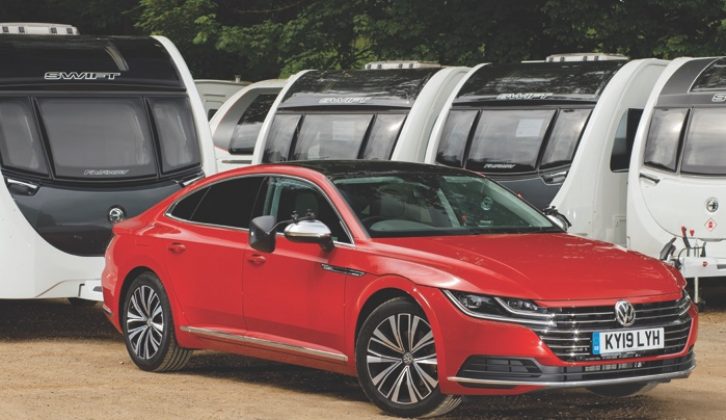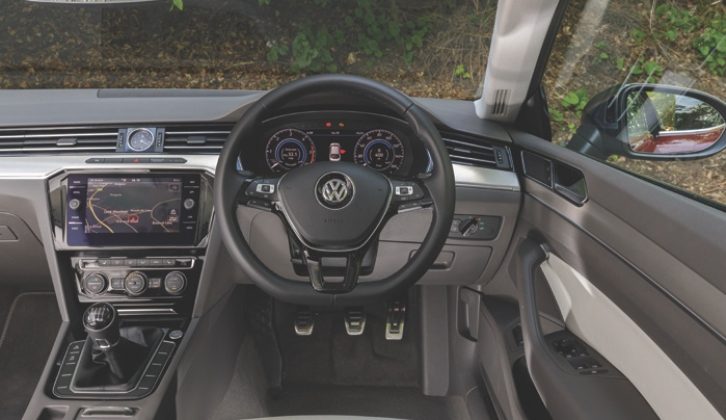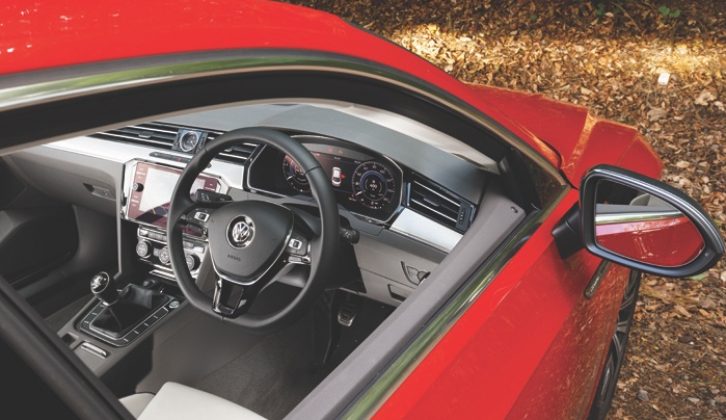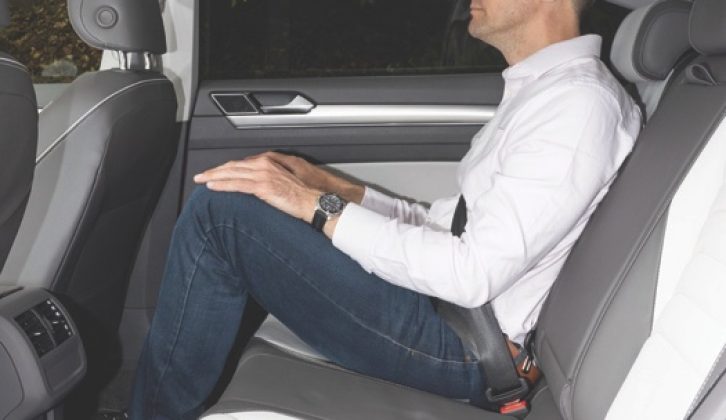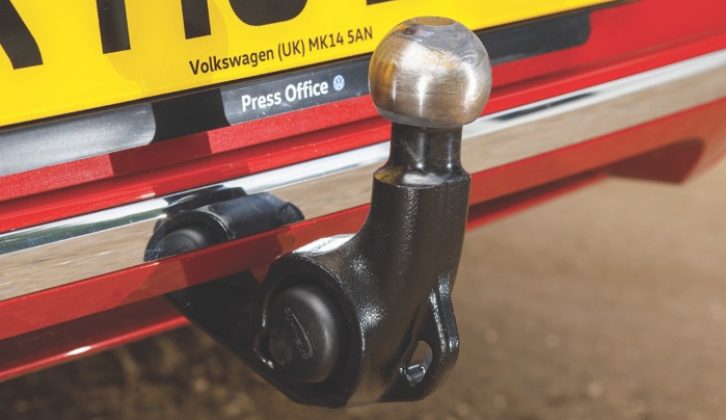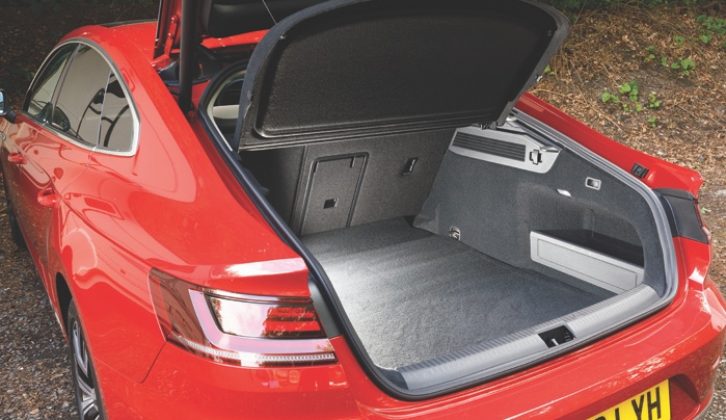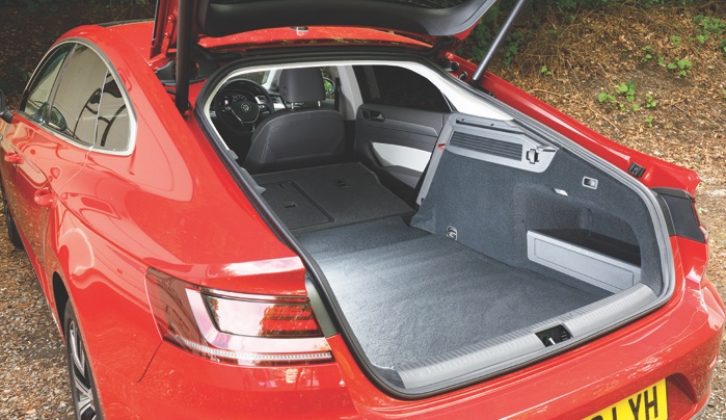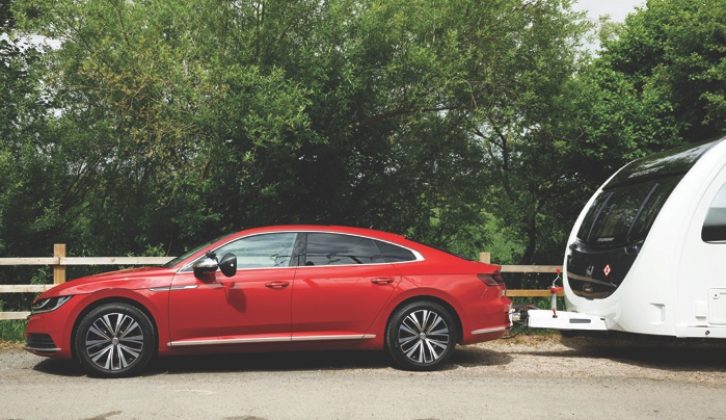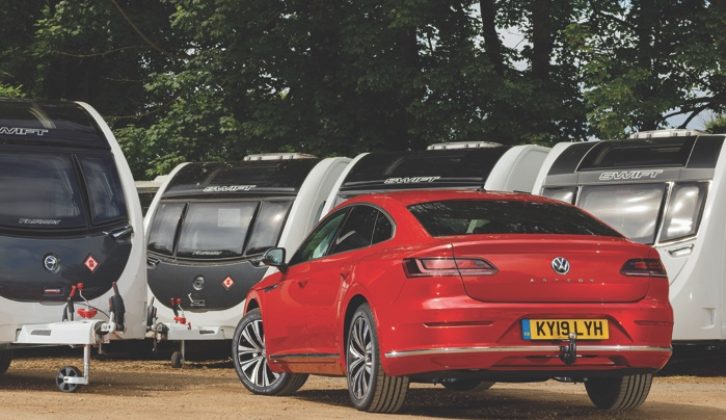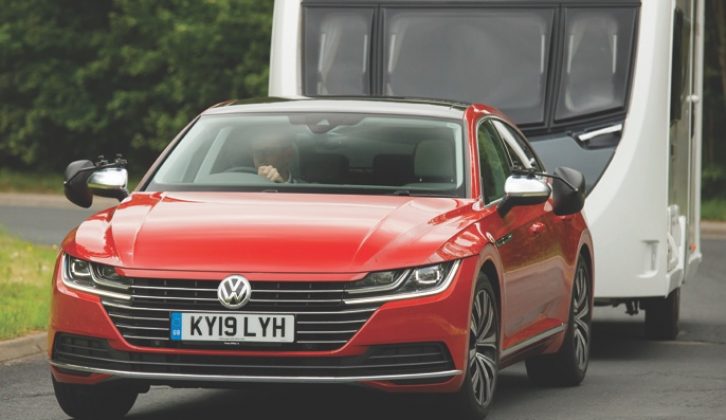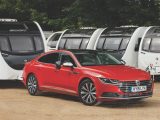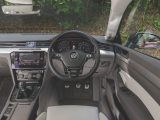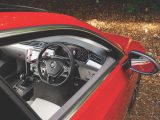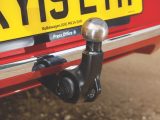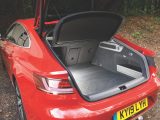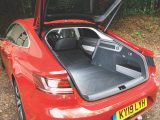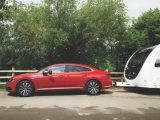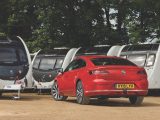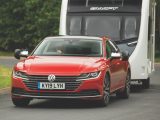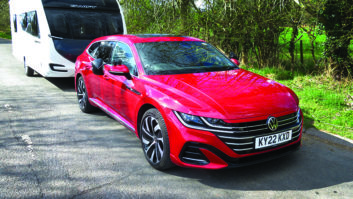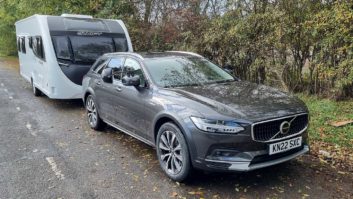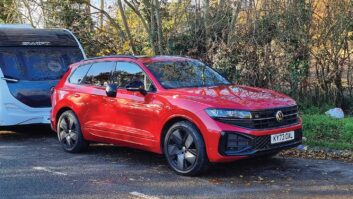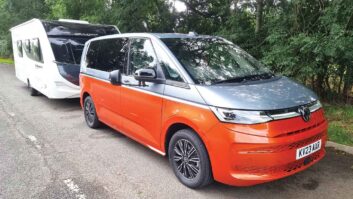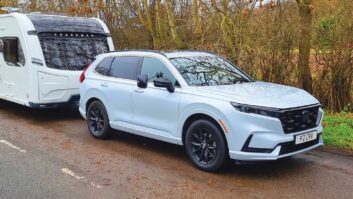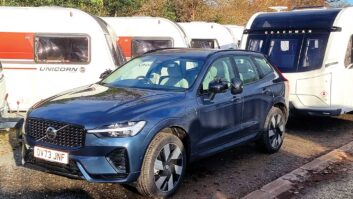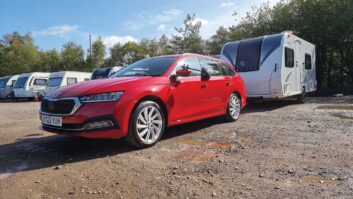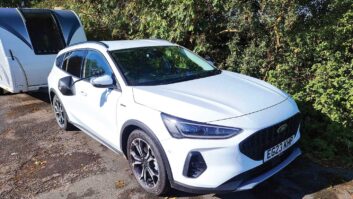Verdict
The more time we spend with the Arteon, the more we like it. Yes, it does seem a rather unlikely tow car, but it’s an exceptionally good one.
The cornerstone of any fine tow car is stability, and the VW is all but unperturbable. It takes a really strong gust of wind before you notice the tourer pulling at the back of the car, and the Arteon quickly settles the caravan again.
You’ll also find there’s plenty of performance from the VW’s 2.0-litre diesel engine. You can buy much quicker versions of the Arteon, but there’s no great need, since the 150PS engine will happily roll up its sleeves and get on with the job.
The advantage of not having more power than you require is excellent fuel economy. Both the manual and auto versions we’ve driven proved efficient.
Looks are very subjective, but we think the Arteon is a very handsome car, and would be prepared to forgive it if style came at the expense of some practicality. However, by the standards of a four-door fastback, it is very roomy. Other than taking care not to knock your head when climbing in the back, it will be asking for very fewer compromises – certainly less than the prestige-badged four-doors the Arteon rivals.
By a smidgen, we prefer the auto to the manual tested here, and are happy enough with the standard suspension to resist the optional adaptive damping. But if you prefer to change gear for yourself, and enjoy tweaking suspension settings to suit the road or your mood, we wouldn’t try to change your mind.
Pros
Excellent towing stability
Quiet, comfortable ride
Cons
Prestigious-badge rivals will hold value better
Limited headroom when climbing in the back
Volkswagen’s Arteon is based on its Passat, but is longer, lower and wider. The striking design marks it out as a more stylish car than the Passat, but VW has engineered the Arteon to offer practicality as well as good looks.
The Arteon is available with a choice of petrol and diesel engines. We’ve been towing with the most affordable diesel, powered by a 150PS (148bhp) engine.
This really isn't your typical tow car, but don't let the looks fool you; the Volkswagen Arteon tows brilliantly
Towing
This really isn’t your typical tow car, but don’t let the looks fool you. The Volkswagen Arteon tows brilliantly.
Our 2.0 TDI 150PS Elegance is the least powerful diesel in the range. If you want more oomph, there’s a 190PS, or a 240PS bi-turbo. Petrol buyers can choose between engines with 150PS, 190PS or 272PS.
We wouldn’t rush to look beyond the 150PS diesel – with 25lb ft of torque, it’s enough to pull any sensibly matched caravan in comfort. We hitched up to a Swift Fairway Platinum 480 with a MiRO of 1282kg.
Of course, one of the more powerful diesels would pull up to speed more quickly, but we’re quite happy with the car’s pace. It has no trouble reaching 60mph and holding it on motorway inclines, and there’s no need to work the gearbox too hard to maintain speed on hilly roads.
The car that took top spot at the Tow Car Awards was a DSG auto, whereas this month’s test car is manual. We think that the smooth-shifting auto better suits the Arteon’s urbane character, but the manual shifts cleanly – the choice is yours.
The other difference in the car tested this month is the Dynamic Chassis Control, an £840 option. This allows the driver to choose from various modes for the suspension, for a more comfortable ride or a sportier drive.
We found it less forgiving of bumps in Sport mode; the Normal setting worked better while towing. And, given that the standard suspension is so well-judged, we’d be happy to save our money.
Whether you plump for the suspension upgrade or not, the Arteon is a very stable tow car. On country roads or motorways, the VW is firmly in charge of the caravan. The wind has to be very strong before you can feel the van gently tugging at the back of the car.
If you come to a halt on a hill, the Arteon will pull away again without any burning smell from the clutch or spinning of wheels, certainly in the dry.
At your destination, the VW is easy to manoeuvre, thanks to light controls and reasonable all-round visibility. A rear-view camera is a £330 option, and one we’d recommend.
The Arteon’s towball deploys at the press of a button, but it needs to be locked in place by hand. The electrics are on the side of the ball well clear of the bumper, which makes plugging into the socket quick and easy.
You can buy quicker tow cars, heavier tow cars, or cars with more seats, for similar money. But we think you’d be quite hard-pressed to find a car that offers you better stability, or combines performance and efficiency as well as the Arteon.
Everyday Driving
As a car to enjoy every day, the Arteon continues to impress. It’s easy to live with, and has a broad range of abilities.
Using Driver Profile Selection alters the throttle response and steering weight. In cars fitted with Dynamic Chassis Control, it also changes the suspension.
Choose Sport, and the extra heft to the steering, tauter suspension and sharper throttle make the Arteon a rewarding car to drive down a twisting A-road. There’s plenty of grip and a sense of balance and agility that belies its size.
However, Sport does make for a less settled quality to the ride. For most drivers, most of the time, the Arteon will be at its best in either Comfort or Normal mode. It still handles well in these settings, but the ride is more settled and supple.
It can be entertaining on the right road, but travelling in quiet and comfort is what the Arteon does best. There’s some road noise at speed, but it’s not excessive. Wind and engine noise are well suppressed.
With a very sound driving position, comfortable seats and a serene high-speed ride, the Arteon is also a stress-free choice for long journeys.
The 2.0-litre diesel engine delivers good performance, thanks to its strong mid-range pull. Accelerate hard and your ears will tell you that you’re driving a diesel, but driven more gently, the engine remains smooth and hushed.
This is an economical car, too. We saw better than 50mpg in motorway driving.
Around town, you are aware this is a long car; at 4.86m from bumper to bumper, it’s nearly 10cm longer than the Passat saloon on which it is based. But standard parking sensors will help you squeeze the Arteon into small spaces.
If you want your four-door coupé to drive like a sports car, the Kia Stinger might suit you better. But for everyone else, the Arteon can strike a fine balance between driver appeal and long-distance comfort.
Space
By rights, going for the Arteon ought to mean compromising on practicality, but you lose almost nothing by choosing it over a Passat. In fact, the Arteon has a longer wheelbase than the Passat, which makes cabin space very generous.
There’s acres of legroom in the back. Headroom is compromised slightly by the curved roofline, but this is more noticeable getting in the car.
The rear seat is better suited to carrying two, rather than three – the chunky transmission tunnel rather gets in the way. We’re pleased to see air vents between the front seats to keep rear-seat passengers cool.
Up front, the Arteon offers lots of space, with plenty of adjustment to the seat and steering wheel.
The dashboard design is standard-issue VW – sensible, ordered, rather conservative. It may lack the visual flair of the Arteon’s exterior, but the dash looks and feels well made.
Boot space is another area where you might expect VW to have compromised for the sake of the Arteon’s good looks, but no. There’s a huge 563 litres, which means it can be quite as accommodating for your luggage as many estate cars.
Running Costs
The Arteon is reasonably priced, given its space, equipment and performance. VW asks £34,745, but What Car?”s Target Price team has found discounts of several thousand pounds.
Elegance spec cars have three-zone climate control, a TFT display screen in place of conventional dials, sat nav with an eight-inch touchscreen, smartphone connectivity and 18-inch alloy wheels.
There’s also a long list of safety equipment, contributing to the car’s five-star rating from the experts at Euro NCAP.
The insurance group of 22E should mean that premiums are reasonable, and we’ve found the Arteon very economical in solo driving and towing. We achieved 32.6mpg in towing the Swift Fairway 480 on country roads, A-roads and motorways.
After three years and 36,000 miles, the Arteon should retain 42% of the original price; a solid rather than spectacular return. Rivals with more prestigious badges are likely to hold their value better over the same period of time.
Overall, the Arteon makes a sound buy, thanks to its reasonable price, healthy list of kit, and low running costs.
Technical Specifications
| Engine Size | 1968 cc |
| Kerbweight | 1614 kg |
| 85% KW | 1372 kg |
| Towball Limit | 90 kg |
| Maximum Towing Limit | 2000 kg |
| Power | 148 bhp |
| Torque | 251 lb ft |
| Offical MPG | 52.6 mpg |
| Towing MPG | 32.6 mpg |
| CO₂ | 112 g/km |
